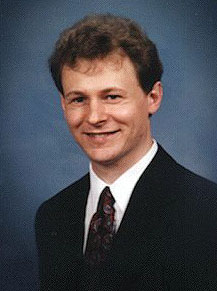Human Consciousness
Spirituality and the brain: Wesley J. Wildman explores a scientific approach to religious experience

Click here to watch Wesley J. Wildman on BUniverse.
Wesley J. Wildman, a School of Theology associateprofessor of theology and ethics, takes a scientific approach to thediscussion of religious and spiritual experiences in the second lecturein the six-part series Religious Experiences: From the Mundane to theAnomalous at Boston University’s Danielsen Institute.Attempting to address the centuries-old question of how humanconsciousness — known to some as the soul — interacts with the brain,Wildman discusses the possibilities, limitations, and implications ofusing scientific observation of the brain to interpret religiousexperiences.
He says brain-imaging technologies, such as EEGsand MRIs, can help to legitimize the study of religious and spiritualexperiences. Yet while scientific studies can eliminate some of theproblems of the field, he says, such as a lack of long-termquantifiable data, neurology does not give a full picture of religiousexperiences. He advocates studying unique individual experiences togive studies “ecological validity.”
Ultimately, Wildmanconcludes, contemporary science has made great progress in showing howsome of our feelings, including religious and spiritual ones, areexpressed in the brain. Still, he argues, a better scientificunderstanding of these experiences does not lead to proof or refutationof a higher power — the human soul and its origins, he says, remain amystery.
Part of a research project at the Danielsen Institute’sCenter for the Study of Religion and Psychology, the lecture series isfunded by a Templeton Foundation grant from the Metanexus Institute,which administers the Templeton Research Lectures.
October 1, 2007, 7:30 p.m.
Sargent College
About the speaker:
Wesley J. Wildmanis an associate professor of theology and ethics at the BostonUniversity School of Theology, where he directs the doctoral programsin Christian theology, in comparative theology, and in science,philosophy, and religion. Wildman has a bachelor’s in mathematics fromFlinders University and a graduate degree in divinity from theUniversity of Sydney, both in Australia. He earned a doctorate inphilosophical and systematic theology and philosophy of religion fromthe Graduate Theological Union, in Berkeley, California. He haspublished more than 60 articles and the book Fidelity with Plausibility: Modest Christologies in the Twentieth Century. Wildman is the coeditor of the Encyclopedia of Science and Religion,as well as of a collection of debates on contemporary issues in religionand science. He has studied the nature and problems of religiousexperience for over a decade through his involvement with the Divine Action Project at Boston University, sponsored by the Vatican Observatory and the Center for Theology and Natural Sciences, in Berkeley, and the Crosscultural Comparative Religious Ideas Project at BU.An ordained minister in the Uniting Church in Australia, Wildman hasserved churches in Sydney, Australia, and Piedmont, California.
Comments & Discussion
Boston University moderates comments to facilitate an informed, substantive, civil conversation. Abusive, profane, self-promotional, misleading, incoherent or off-topic comments will be rejected. Moderators are staffed during regular business hours (EST) and can only accept comments written in English. Statistics or facts must include a citation or a link to the citation.